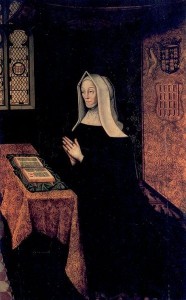 On the day after Henry VIII’s 18th birthday and one of his coronation celebratory jousts, his grandmother and the matriarch of the Tudor dynasty, Lady Margaret Beaufort, died. She was in her late sixties, a good age for a Tudor woman, and had outlived her son, Henry VII, her daughter-in-law, Elizabeth of York, her grandson, Prince Arthur, and her fourth and final husband. She had also lived to see her grandson, Henry, become King and get married.
On the day after Henry VIII’s 18th birthday and one of his coronation celebratory jousts, his grandmother and the matriarch of the Tudor dynasty, Lady Margaret Beaufort, died. She was in her late sixties, a good age for a Tudor woman, and had outlived her son, Henry VII, her daughter-in-law, Elizabeth of York, her grandson, Prince Arthur, and her fourth and final husband. She had also lived to see her grandson, Henry, become King and get married.
David Starkey, in “Henry: Virtuous Prince”, wrote of how Margaret “had played a leading part in the preparations for the coronation”, meeting with the council to make the necessary arrangements, so she was obviously well enough between April and June to take that on. Starkey also tells of how Margaret watched the eve-of-coronation procession with her granddaughter, Mary, from a latticed viewing point in a house on Cheapside. Apparently she was joyous at the coronation the following day but then “cast a pall on things by muttering that ‘some adversity would follow'”. This feeling of doom didn’t stop her enjoying the coronation banquet, though, and Starkey wonders if she might have eaten a little “too heatily”, as Lord Morley, described how Margaret “took her infirmity with eating of a cygnet”.
A few days later, on the morning of the 29th June 1509, John Fisher, Bishop of Rochester, was summoned to perform last rites and this formidable woman slipped away as he held up the host.
As Starkey points out, Henry VIII had now “lost the two dominant figures of his youth: his father and his grandmother” and “he was now not only king but paterfamilias and undisputed head of his family.” He was in charge and he was his own man at long last.
You can read more about Margaret in my article “Lady Margaret Beaufort”.
Notes and Sources
- Henry: Virtuous Prince, David Starkey, p296 of UK hardback version in Chapter 21 “Coronation”.